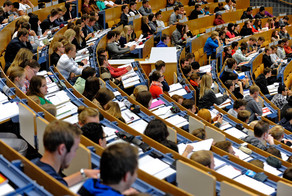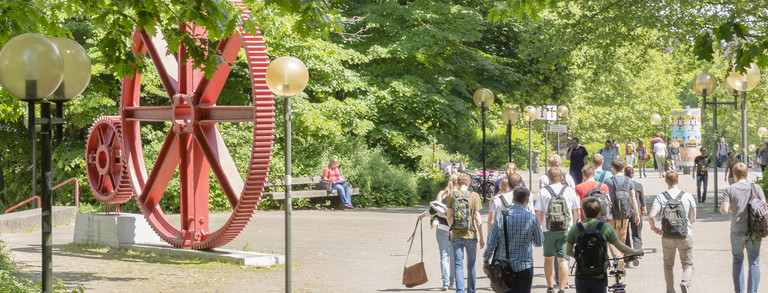Welcome!
Welcome to the Faculty of Humanities and Theology! On this webpage we provide a short overview of research and study programs as well as organizational aspects of the faculty. The Faculty of Humanities and Theology comprises the Departments of Catholic Theology and Protestant Theology as well as a joint Department of Philosophy and Political Science. There is an interdisciplinary focus on teaching and research in the field of “Religion and Politics” with special emphasis on philosophical references.
Research
The research profile of the Faculty of Humanities and Theology is characterized, on the one hand, by a broad spectrum of subjects and institutes. On the other, it demonstrates a strong interest in interdisciplinary research as well as pursuing activities at the interface of philosophy, political science and the theologies, such as joint research projects ("Cohesion in Europe", Graduate School on Political Cohesion), conferences ("Religion as Strategy and Ideology"), international research and study trips (“Open Spaces: Religion and Democracy in Indonesia and Beyond”), as well as a number of frequent student and staff exchange activities (Erasmus fellowships, Gambrinus fellowships, etc.).
For further information please visit the website of the International Office at TU Dortmund University.
Study Programs
The Faculty of Humanities and Theology offers a wide range of study programs. You can find further information about the content and curriculum of the individual degree programs on each respective webpage. If you have any questions, please contact the respective departmental student adviser. Thank you.
Research-oriented Master’s Programs
The interdisciplinary Master’s programs allow students to develop an individual study profile on the basis of which current social topics are analyzed from the perspectives of the respective disciplines. The programs provide for both practical and research-based activities. Excellent supervision by the lecturers ensures that selected topics can be discussed controversially and that studies run smoothly.
In the Master's program Religion, Ethics, and Politics (MaREPol), students address the relationship between religion, society and politics as well as the challenges which result from the divisions between them. At the core of MaREPol we have identified three interdisciplinary generic terms that pool seminars in the form of overall clusters: Tolerance, Conflict, and Identity. The MaREPol program focuses on three main aspects:
- Choice of two clusters from Tolerance, Conflict, or Identity
- Focus on research or vocational orientation
- Practical orientation, e.g. through insights into project management
Complex social challenges increasingly require interdisciplinary solutions. In the Master's program Philosophy and Political Science (MAPP), we enable this process by systematically combining perspectives deriving from philosophy and political science with linked, global thinking and intercultural understanding. The MAPP program focuses on three main aspects:
- Interdisciplinarity in small seminar groups
- Focus on philosophy or political science
- Project phases and research management
Study Programs: Teacher Education (Bachelor of Arts as well as Master of Education)
The faculty offers a wide range of subjects covered by the individual departments responsible for Bachelor's and Master's degrees in teacher education. Further information can be found on the websites of the individual institutes as well as the Dortmund Competence Center for Teacher Education (https://www.dokoll.tu-dortmund.de/cms/de/dokoll/index.html - in German only).
International Cooperation
The Faculty of Humanities and Theology maintains Strategic Partnerships with
- Parahyangan University (UNPAR) in Bandung, Indonesia, as well as
- Charles University in Prague, Czech Republic.
The Faculty's Partner Universities:
- Universitetet i Bergen (Bergen)
- Sveučilište u Rijeci (Rijeka)
- Universidad de Sevilla (Sevilla)
- Università degli Studi di Torino (Turin)
- University of Umeå (Sweden)
- Universität Wien (Vienna)
- Universitatea din Bucuresti (Bucharest)
- Università Tà Malta (Valetta)
- Jihoceská Univerzita v Ceskych Budejovicich (České Budějovice/Budweis)
- Newman University College (Birmingham)
- Newmaninstitutet (Uppsala)
- Pontifical University Maynooth (Kildare)
- Universitatea 'Babes-Bolyai' din Cluj-Napoca (Cluj-Napoca)
- Uniwersytet Kardynala Stefana Wyszyñskiego w Warszawie (Warsaw)






